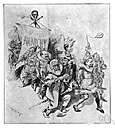anarchy
(redirected from anarchies)Also found in: Thesaurus, Legal, Encyclopedia.
anarchy
the absence of laws or government: The fall of the empire was followed by chaos and anarchy.
Not to be confused with:
aristocracy – rule by elite or privileged upper class: The governing body was composed of the country’s most powerful aristocracy.
democracy – government by the people: The United States is a democracy.
oligarchy – government by the few: The citizens have no voice in an oligarchy.
plutocracy – government in which the wealthy class rules: In a plutocracy, there is little regard for the poor.
Abused, Confused, & Misused Words by Mary Embree Copyright © 2007, 2013 by Mary Embree
an·ar·chy
(ăn′ər-kē)n. pl. an·ar·chies
1. Absence of any form of political authority.
2. Political disorder and confusion.
3. Absence of any cohesive principle, such as a common standard or purpose.
[New Latin anarchia, from Greek anarkhiā, from anarkhos, without a ruler : an-, without; see a-1 + arkhos, ruler; see -arch.]
American Heritage® Dictionary of the English Language, Fifth Edition. Copyright © 2016 by Houghton Mifflin Harcourt Publishing Company. Published by Houghton Mifflin Harcourt Publishing Company. All rights reserved.
anarchy
(ˈænəkɪ)n
1. (Government, Politics & Diplomacy) general lawlessness and disorder, esp when thought to result from an absence or failure of government
2. (Government, Politics & Diplomacy) the absence or lack of government
3. the absence of any guiding or uniting principle; disorder; chaos
4. (Government, Politics & Diplomacy) the theory or practice of political anarchism
[C16: from Medieval Latin anarchia, from Greek anarkhia, from anarkhos without a ruler, from an- + arkh- leader, from arkhein to rule]
anarchic, anˈarchical adj
anˈarchically adv
Collins English Dictionary – Complete and Unabridged, 12th Edition 2014 © HarperCollins Publishers 1991, 1994, 1998, 2000, 2003, 2006, 2007, 2009, 2011, 2014
an•ar•chy
(ˈæn ər ki)n.
1. a state of society without government or law.
2. political and social disorder due to the absence of governmental control.
3. a theory that regards the absence of all direct or coercive government as a political ideal and that proposes the cooperative and voluntary association of individuals and groups as the principal mode of organized society.
4. confusion; chaos; disorder.
[1530–40; < Middle French anarchie or Medieval Latin anarchia < Greek anarchía lack of a leader]
an•ar•chic (ænˈɑr kɪk) an•ar′chi•cal, adj.
an•ar′chi•cal•ly, adv.
Random House Kernerman Webster's College Dictionary, © 2010 K Dictionaries Ltd. Copyright 2005, 1997, 1991 by Random House, Inc. All rights reserved.
anarchy
an absence of government and law; political disorder, often accompanied by violence. See also order and disorder.
See also: Governmentextreme disorder. See also government.
See also: Order and Disorder-Ologies & -Isms. Copyright 2008 The Gale Group, Inc. All rights reserved.
ThesaurusAntonymsRelated WordsSynonymsLegend:
Switch to new thesaurus
| Noun | 1. |  anarchy - a state of lawlessness and disorder (usually resulting from a failure of government) anarchy - a state of lawlessness and disorder (usually resulting from a failure of government)governing, government activity, government, governance, administration - the act of governing; exercising authority; "regulations for the governing of state prisons"; "he had considerable experience of government" disorder - a disturbance of the peace or of public order nihilism - complete denial of all established authority and institutions |
Based on WordNet 3.0, Farlex clipart collection. © 2003-2012 Princeton University, Farlex Inc.
anarchy
noun lawlessness, revolution, riot, disorder, confusion, chaos, rebellion, misrule, disorganization, misgovernment Their liberal traditions were slipping into anarchy.
government, order, control, law, rule, peace, discipline, law and order
government, order, control, law, rule, peace, discipline, law and order
Collins Thesaurus of the English Language – Complete and Unabridged 2nd Edition. 2002 © HarperCollins Publishers 1995, 2002
anarchy
nounA lack of civil order or peace:
The American Heritage® Roget's Thesaurus. Copyright © 2013, 2014 by Houghton Mifflin Harcourt Publishing Company. Published by Houghton Mifflin Harcourt Publishing Company. All rights reserved.
Translations
فَقْدَان الحُكْمفَوْضى
анархия
anarchiebezvládíchaoszmatek
anarkilovløshed
anarkia
anarhija
anarchia
stjórnleysi
anarchijaanarchistasanarchizmaschaosassuirutė
anarhijasajukums
anarhie
anarchiabezvládie
anarki
anarşikarışklık
Collins Spanish Dictionary - Complete and Unabridged 8th Edition 2005 © William Collins Sons & Co. Ltd. 1971, 1988 © HarperCollins Publishers 1992, 1993, 1996, 1997, 2000, 2003, 2005
Collins English/French Electronic Resource. © HarperCollins Publishers 2005
anarchy
n → Anarchie f
Collins German Dictionary – Complete and Unabridged 7th Edition 2005. © William Collins Sons & Co. Ltd. 1980 © HarperCollins Publishers 1991, 1997, 1999, 2004, 2005, 2007
Collins Italian Dictionary 1st Edition © HarperCollins Publishers 1995
anarchy
(ˈӕnəki) noun1. the absence or failure of government. Total anarchy followed the defeat of the government.
2. disorder and confusion.
ˈanarchist noun1. a person who believes that governments are unnecessary or undesirable.
2. a person who tries to overturn the government by violence.
ˈanarchism nounKernerman English Multilingual Dictionary © 2006-2013 K Dictionaries Ltd.